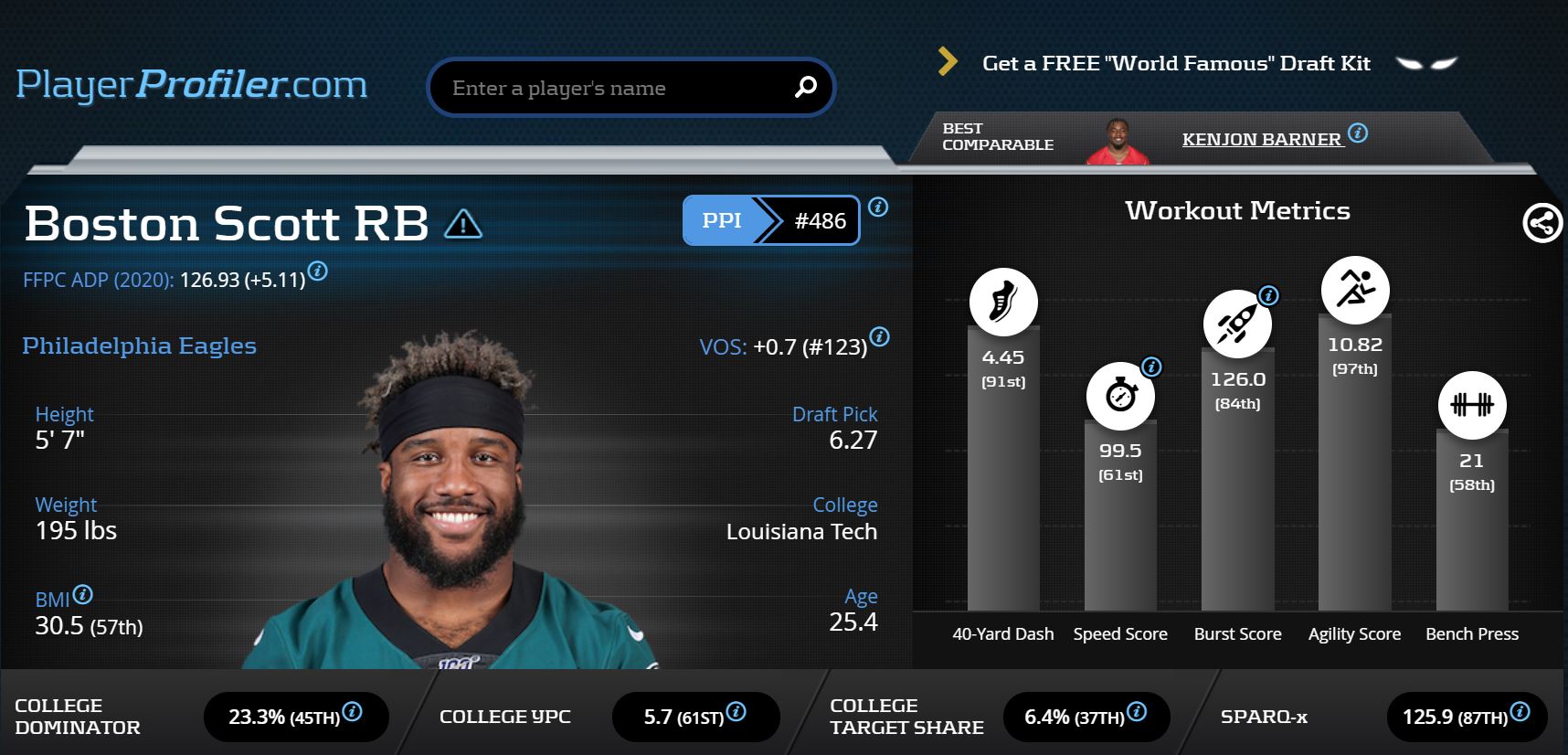In 2019, five running backs finished inside the top 30 in fantasy points scored while not being listed as a Week 1 starter. Kenyan Drake was traded from Miami to Arizona in Week 9 after David Johnson and Chase Edmonds were injured. Raheem Mostert and Latavius Murray also took advantage of injuries on their own teams. Murray started eight games, while Mostert started zero but finished No. 26 in fantasy points scored. Tarik Cohen and Duke Johnson played key roles as satellite backs in Chicago and Houston. Cohen and Johnson both finished with more receiving yards than rushing yards while playing alongside bellcow running backs. PlayerProfiler’s advanced stats & metrics point us to five new players who have the opportunity to finish as top 30 backs while starting Week 1 lower than that on the depth chart.
Tony Pollard (FFPC ADP: 124.53) (RB47)
Despite Ezekiel Elliott playing in all 16 games last year, Tony Pollard was able to eclipse 100 touches on a top-3 offense. Pollard averaged 5.6 (No. 8 among qualified running backs) Yards Per Touch while scoring three (No. 50) touchdowns as the handcuff to an elite back. He displayed big-play ability in spite of a 19.3-percent (No. 97) Snap Share, proving he can be used as a weapon when paired with Elliott. In a Week 14 blowout against the Rams, he added three 25-plus yard rushes to his total, the best being a 44-yard touchdown to put the game on ice late in the fourth quarter.
https://www.youtube.com/watch?v=zdOGTbpfxBU
Pollard proved in Year 1 that his play will do the talking, and that if called upon, he can lead the Dallas backfield. With Elliott under contract until 2026, Pollard looks to become the best handcuff in all the NFL, with starter and RB1 upside in fantasy.
Boston Scott (ADP: 126.93) (RB48)
Philadelphia hasn’t had a running back eclipse 200 rushing attempts in a season since LeSean McCoy in 2014. Miles Sanders led the Eagles in 2019 with 179 (No. 22) carries, while Jordan Howard tallied 119 (No. 37) and Boston Scott had 61 (No. 60). In March, Howard left Philadelphia to sign with the Miami Dolphins. The departures of Howard, Jay Ajayi, and Darren Sproles leave 150 (No. 8) Vacated Carries for the likes of Sanders and Scott.
Standing at 5-7, Scott packs a punch with his 4.45 (91st-percentile) 40-yard dash and 10.82 (97th-percentile) Agility Score. Scott finished 2019 on a tear, totaling 350 yards from scrimmage and four touchdowns over the final four games. Although undersized, he fits perfectly in the Eagles scheme as a satellite back and spot starter with RB2 upside.
Chase Edmonds (ADP: 119.20) (RB44)
In 2019, Arizona had four players who rushed for over 300 total yards. After six weeks of David Johnson underperforming, and Chase Edmonds being injured after bursting into the light, the Cardinals made a deadline deal for Kenyan Drake. Edmonds used a 10.86 (97th-percentile) Agility Score to control the backfield from Weeks 5-7. In those three weeks, he totaled 303 yards and five touchdowns on 47 touches.
https://www.youtube.com/watch?v=yWm7U2vKQE8
Had Edmonds not injured his leg as a senior, he was on pace to break the all-time FCS Rushing record held by Adrian Peterson (the other one) of Georgia Southern. Edmonds had 250-plus carries and 1,600 yards in each of his first three seasons at Fordham, finishing only 700 yards short of Peterson. Graduating with over 900 carries, 70 touchdowns, and 80 receptions made him the most prolific back in FCS college football history. Not many top workhorse running backs in the game are under 210-pounds, but Edmonds has the ability to buck that trend.
Justin Jackson (ADP: 165.33) (RB56)
While Melvin Gordon was holding out in 2019, Justin Jackson was busy competing with Austin Ekeler for touches. In three weeks as the primary backup, Jackson averaged eight touches per game to 19 for Ekeler. Jackson’s ability to evade tacklers with a 10.88 (96th-percentile) Agility Score allowed him to gain 6.9 Yards Per Carry and nine first downs on only 29 (No. 82) carries.
Check out Justin Jackson’s 2020 Projection on PlayerProfiler’s “World Famous” Draft Kit:
With the addition of rookie bruiser Joshua Kelley, Jackson will have to step up to solidify the backup role to Ekeler. In an interview with NFL Network’s Michael Silver, Coach Anthony Lynn said the team is looking for “big things” from Jackson in 2020. He and Ekeler boast similar metrics across the board. While Jackson is taller and Ekeler weighs more, both recorded top-60 marks in Yards Created while playing behind Gordon. In the event Ekeler goes down, it would be the third-year veteran Jackson that would get the call to replace him, not the rookie Kelley.
Honorable Mention (Low-Risk)
Jerick McKinnon (ADP: 168.24) (RB57)
In 2019, San Francisco used three running backs almost every game. Jerick McKinnon looks to not only take over the departed Matt Breida‘s role, but expand on it and get back to the every-down role he played in 2017. Tevin Coleman started 11 games last year, while Breida started five, and Raheem Mostert started zero.
Carlos Hyde (ADP: 206.05) (RB63)
At age 29, Carlos Hyde was traded from Kansas City to Houston after the Chiefs decided Damien Williams was the back of the future. Hyde landed in a bell-cow role in Houston, finishing with 1,100 total yards after spending four years in San Francisco and never cresting 1,000 yards rushing. The opportunity in Seattle with injuries to Rashaad Penny and Chris Carson in 2019 could lead to a bellcow role for Hyde at any time in 2020.




